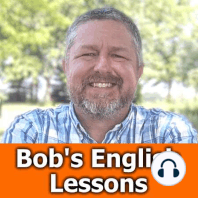4 min listen

Learn the English Terms THE BIG SCREEN and THE SMALL SCREEN
Learn the English Terms THE BIG SCREEN and THE SMALL SCREEN
ratings:
Length:
4 minutes
Released:
Aug 13, 2021
Format:
Podcast episode
Description
Read along to practice your English and to learn the English terms THE BIG SCREEN and THE SMALL SCREENIn this English lesson, I wanted to help you learn the English term, the big screen. The big screen is simply another way of saying the movies. There might be an actor that you know really well and you see him quite often on the big screen. This would mean that that actor often plays roles in movies. So sometimes when you read a book, it might be adapted for the big screen. They might take that book and then make a script out of it and then make it into a movie and then you can go and see the same story that you read in the book, you can go see it on the big screen.WANT FREE ENGLISH LESSONS? GO TO YOUTUBE AND SEARCH, "BOB THE CANADIAN"If you enjoy these lessons please consider supporting me at: http://www.patreon.com/bobthecanadianThe other term I wanted to teach you today is, of course, the small screen. The small screen is simply another way of saying the television. Now I'm not 100% sure if this also means Netflix or your phone, but definitely in the past, and even still a little bit now, we would say the small screen, and we would be talking about the television. You might have a favorite actor who used to be in movies, but lately, that actor has started to do more, to play more roles on the small screen. That would mean instead of being in movies, that actor is now normally seen on television.So to review. The big screen simply means the movies and the small screen simply means the television. I think you can understand where these terms come from, right? The movie theater has a very, very big screen, and your television, I guess is somewhat big, but not nearly as big as the movie theater.But, hey, let's look at a comment from a previous video. This comment is from Lolly Lolly, I think.By the way, Oscar's just kind, gent-- Nicely sleeping there. Oh, now he just kind of looked at me. I think he knows he's on camera. Shh, don't say anything.The comment from Lolly Lolly is this. Hello from France. Do you think that some of your children will follow in your footsteps on the farm? Thanks, Bob. My reply is I'm really not sure. We're taking a wait and see approach. We're not pressuring any of them. Right now, it seems like they have a lot of other interests.So that's a great question, Lolly Lolly. Often, it's hard to know as a farm dad and farm mum, it's hard to know if any of the kids are interested in working on the farm. Should we pet Oscar for a sec? Hi, puppy. And we don't want to pressure them. We don't want to try. We don't want them to think that they have to do it. We know they have lots of other interests. They like computers. They like music. They like sports. There's all kinds of things that children are naturally interested in and we don't want to force them. We don't want to say you have to take over the farm, so we're taking a wait and see approach. A wait and see approach is exactly what it sounds like. You wait and you see what happens. So they're still quite young. We'll see what happens in a few years. What often happens with kids who grow up on farms is, later in life, when they're in their 20s or 30s, they start to have fond memories of what it was like to be on the farm.Support the show (https://www.patreon.com/bobthecanadian)
Released:
Aug 13, 2021
Format:
Podcast episode
Titles in the series (100)
Learn the English Phrases THE GRAND TOUR and TOURIST TRAP by Bob's Short English Lessons